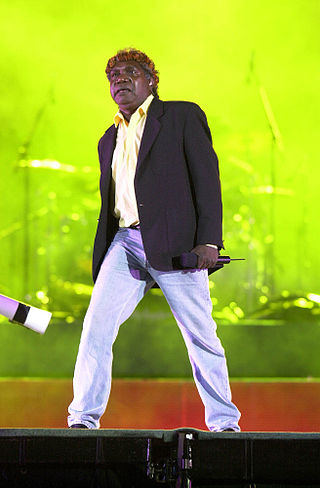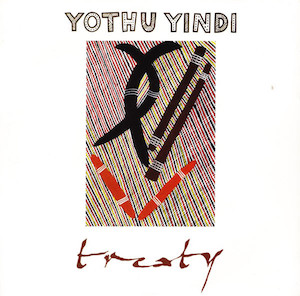Related Research Articles

Yothu Yindi are an Australian musical group with Aboriginal and non-Aboriginal members, formed in 1986 as a merger of two bands formed in 1985 – a white rock group called the Swamp Jockeys, and an unnamed Aboriginal folk group consisting of Mandawuy Yunupingu, Witiyana Marika, and Milkayngu Mununggur. The Aboriginal members came from Yolngu homelands near Yirrkala on the Gove Peninsula in Northern Territory's Arnhem Land. Founding members included Stuart Kellaway on bass guitar, Cal Williams on lead guitar, Andrew Belletty on drums, Witiyana Marika on manikay, bilma and dance, Milkayngu Mununggurr on yidaki, Geoffrey Gurrumul Yunupingu on keyboards, guitar, and percussion, past lead singer Mandawuy Yunupingu and present Yirrnga Yunupingu on vocals and guitar.

Tribal Voice is the second studio album by Yothu Yindi, released in September 1991 on the Mushroom Records label. The album peaked at number 4 on the ARIA Charts and was certified 2× Platinum.

Freedom is the third studio album by Australian band, Yothu Yindi released in 1993. The album peaked at number 31 on the ARIA charts.

Mandawuy Djarrtjuntjun Yunupingu, formerly Tom Djambayang Bakamana Yunupingu, and also known as Dr Yunupingu, was a teacher and musician, and frontman of the Aboriginal rock group Yothu Yindi from 1986. He was an Aboriginal Australian man of the Yolŋu people, with a skin name of Gudjuk.

Galarrwuy Yunupingu, also known as James Galarrwuy Yunupingu and Dr Yunupingu, was an Indigenous Australian activist who was a leader in the Aboriginal Australian community. He was involved in Indigenous land rights throughout his career. He was a Yolngu man of the Gumatj clan, from Arnhem Land in the Northern Territory. He was the 1978 Australian of the Year.

The Yolngu or Yolŋu are an aggregation of Aboriginal Australian people inhabiting north-eastern Arnhem Land in the Northern Territory of Australia. Yolngu means "person" in the Yolŋu languages. The terms Murngin, Wulamba, Yalnumata, Murrgin and Yulangor were formerly used by some anthropologists for the Yolngu.

Bangarra Dance Theatre is an Aboriginal and Torres Strait Islander dance company focused on contemporary dance. It was founded by African American dancer and choreographer Carole Y. Johnson, Gumbaynggirr man Rob Bryant, and South African-born Cheryl Stone. Stephen Page was artistic director from 1991 to 2021, with Frances Rings taking over in 2022.

Yirrkala is a small community in East Arnhem Region, Northern Territory, Australia, 18 kilometres (11 mi) southeast of the large mining town of Nhulunbuy, on the Gove Peninsula in Arnhem Land. Its population comprises predominantly Aboriginal Australians of the Yolngu people, and it is also home to a number of Mission Aviation Fellowship pilots and engineers based in Arnhem Land, providing air transport services.

Yolŋu Matha, meaning the 'Yolŋu tongue', is a linguistic family that includes the languages of the Yolngu, the indigenous people of northeast Arnhem Land in northern Australia. The ŋ in Yolŋu is pronounced as the ng in singing.
Marika is a both a given name and surname. As a feminine given name, it is of Hungarian and Greek origin; a diminutive of Maria. Apart from Hungary and Greece, the name is also found in Estonia, Finland, Japan, Sweden, and Poland. In Fiji, it is a masculine given name.
Raymattja Marika, also known as Gunutjpitt Gunuwanga, was a Yolngu leader, scholar, educator, translator, linguist and cultural advocate for Aboriginal Australians. She was a Director of Reconciliation Australia and a member of the Australian Institute of Aboriginal and Torres Strait Islander Studies. She was also a director of the Yothu Yindi Foundation and a participant in the 2020 Summit, which was held in April 2008. Marika advocated understanding and reconciliation between Indigenous Australian and Western cultures.

Bedevil, styled BeDevil, is a 1993 Australian horror film directed by Tracey Moffatt, the first feature directed by an Australian Aboriginal woman.

"Treaty" is a protest song by Australian musical group Yothu Yindi, which is made up of Aboriginal and balanda (non-Aboriginal) members. Released in June 1991, "Treaty" was the first song by a predominantly Aboriginal band to chart in Australia and was the first song partly in any Aboriginal Australian language to gain extensive international recognition, peaking at No. 6 on the Billboard Hot Dance Club Play singles charts. The song contains lyrics in Gumatj, one of the Yolngu Matha dialects and a language of the Yolngu people of Arnhem Land in northern Australia.
East Journey are a rock/reggae band from North East Arnhem Land, Northern Territory. They combined modern and traditional music and sing in both English and Yolŋu.
Banduk is a 1985 Australian television film shot in Nhulunbuy in East Arnhem Land, Northern Territory of Australia.
Jindalee Lady is a 1992 Australian film about an Aboriginal Australian woman who is a successful fashion designer. Directed by Brian Syron, it is the first feature film directed by an Aboriginal person in Australia. It is also notable for featuring dancers from the Bangarra Dance Theatre.
Roy Dadaynga Marika was an Aboriginal Australian artist and Indigenous rights activist. He was a member of the Marika family, brother of Mawalan 1 Marika, Mathaman Marika, Milirrpum Marika and Dhunggala Marika.
Witiyana Marika is an Aboriginal Australian musician, filmmaker and elder, known for being a founding member of the band Yothu Yindi and producer of the film High Ground.
Kathy Balngayngu Marika is an Aboriginal Australian dancer known for her performances with Bangarra Dance Theatre, with which she served as artist-in-residence and cultural consultant.
Gavin Campbell is an Australian club DJ and remixer based in Melbourne, Victoria. He created the dance music production outfit known as Filthy Lucre, which is known for its 1991 remix of Yothu Yindi's single, "Treaty", known as "Treaty ".
References
- 1 2 3 "Banula Marika". Bangarra Knowledge Ground. Retrieved 25 July 2021.
- ↑ "Jindalee Lady". Ozmovies. Retrieved 26 August 2021.
- ↑ Jindalee Lady at IMDb
- ↑ "Bedevil: When the unexplained happens [Press kit]" (PDF). Ronin Films. Retrieved 25 July 2021.
For the role of Stompie... Moffatt turned to the Bangarra Dance Theatre in Redfern, casting Banula Marika, a member of the famous Marika family of Arnhem Land... Banula had never acted before, but he had a quality of stillness which was exactly right.
- ↑ "Banula Marika". AusStage. Retrieved 25 July 2021.
- ↑ 2020 Annual Report (PDF) (Report). Bangarra Dance Theatre. 2020. p. 27.
- ↑ McFarlane, Ian (1999). "Encyclopedia entry for 'Yothu Yindi'". Encyclopedia of Australian Rock and Pop . Allen & Unwin. ISBN 1-86448-768-2. Archived from the original on 30 September 2004. Retrieved 4 November 2008.
- ↑ "The Genesis Project (DD)". Apple Music. February 2015. Retrieved 25 July 2021.
- ↑ James, Felicity (24 July 2015). "PJ White from East Journey and Banula Marika from Yothu Yindi" (Photo). ABC News. Retrieved 25 July 2021.
PJ White from East Journey and Banula Marika from Yothu Yindi rehearsing before National Indigenous Music Awards 2015.
- ↑ Kingma, Jennifer (10 March 2012). "A passion for dance". The Sydney Morning Herald . Retrieved 25 July 2021.
- ↑ Potter, Michelle (21 March 2013). "Morning Star. Mirramu Dance Company". Michelle Potter... On Dancing. Retrieved 9 December 2022.
- ↑ 2018-19 Annual Report (PDF) (Report). Dhimurru Aboriginal Corporation. 2019. p. 6.
- ↑ "Board of Directors". Dhimurru Aboriginal Corporation. Retrieved 25 July 2021.
- ↑ "What is the source of all this rubbish?". GhostNets Australia. Retrieved 25 July 2021.
- ↑ Hoffmann, Benjamin D.; Roeger, Steve; Wise, Phil; Dermer, Jane; Yunupingu, BaluPalu; Lacey, Daryl; Yunupingu, Djäwa; Marika, Banula; Marika, Mandaka; Panton, Bill (2012). "Achieving highly successful multiple agency collaborations in a cross-cultural environment: experiences and lessons from Dhimurru Aboriginal Corporation and partners". Ecological Management & Restoration. Wiley. 13 (1): 42–50. doi: 10.1111/j.1442-8903.2011.00630.x . ISSN 1442-7001.
- ↑ Braby, Michael F. (2007). National Recovery Plan for the Gove Crow Butterfly, Euploea alcathoe enastri (PDF) (Report). Department of Natural Resources, Environment and the Arts, Northern Territory. p. 10.
- ↑ "Arnhem Land shoot for dance show". Deadly Vibe. 10 January 2014.